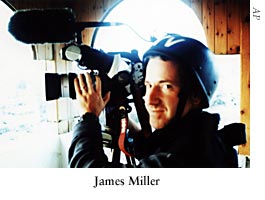New York, April 14, 2005—The Israel Defense Forces said today that it would not take disciplinary action against an officer thought responsible for the May 2003 shooting death of British freelance cameraman and film director James Miller in the Gaza Strip. The Committee to Protect Journalists is deeply disturbed by the decision, which comes one month after the army declined to press criminal charges against the officer.
“We are appalled that nearly two years after the death of James Miller, no one has been held accountable,” CPJ Executive Director Ann Cooper said. “The failure to assign any responsibility for this shocking and unnecessary death reflects an official disregard for the safety of journalists.”
Brig. Gen. Guy Tzur, head of the Israeli army’s southern command, acquitted the IDF lieutenant of improper use of weapons after a disciplinary hearing, according to international news reports. The officer, who has not been identified by name, was the commanding officer at the site of the shooting in Rafah.
Last month, the military’s prosecutor general decided against bringing criminal charges but told members of Miller’s family that the officer would face disciplinary measures for violating the rules of engagement and for changing his account of the incident.
The IDF said then that a military police investigation showed that the officer “allegedly fired his weapon in breach of IDF rules of engagement” but that it was not “legally possible to link this shooting to the gunshot sustained by Mr. Miller.”
Miller’s family has criticized the IDF for taking excessive time in completing the inquiry; failing to make public the army’s initial investigative findings; and failing to immediately collect critical evidence such as the rifles of the army unit that was involved. Miller’s wife, Sophy, condemned the decision in a statement issued today.
Miller was shot once in the neck on May 2, 2003. An award-winning documentary filmmaker, he was with a crew filming an HBO documentary about the Israeli-Palestinian conflict. When they attempted to leave the area that evening, Miller and several crew members said they came under fire as they tried to identify themselves to Israeli troops in armored personnel carriers about 110 yards (100 meters) away.
The journalists said they were wearing jackets and helmets marked “TV,” and they held a white flag illuminated by a flashlight. The Israeli army said its troops were returning fire after being attacked with rocket-propelled grenades.
An investigation sponsored by Miller’s colleagues, family, and friends—conducted by British security consultant Chris Cobb-Smith of the security company Chiron Resources Limited—concluded that IDF soldiers “consciously and deliberately targeted” Miller and his crew.
The report noted that the area where Miller’s crew was operating had been quiet for about an hour before he was killed. Prior to that time, sporadic gunfire was heard but not in the journalists’ vicinity.
For a detailed account of the shooting, click here.
At least seven journalists have been killed in the Occupied Territories since 2000, all by Israeli gunfire. In most cases, the army has failed to conduct serious investigations or publicly account for them.
